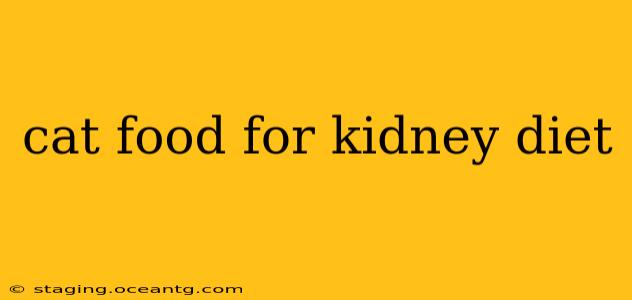Chronic kidney disease (CKD) is a prevalent and progressive condition affecting many cats, often diagnosed in their senior years. Managing CKD requires a specialized diet tailored to support their compromised kidneys and overall health. Choosing the right cat food is crucial, and this guide will help you navigate the options and make informed decisions for your feline companion.
What Makes Cat Food Suitable for Kidney Diets?
Kidney-friendly cat food is formulated with specific nutritional adjustments to reduce the strain on the kidneys. Key features include:
-
Reduced Phosphorus: Phosphorus is a mineral cats need, but in CKD, the kidneys struggle to process excess amounts efficiently. High phosphorus levels contribute to mineral imbalances, exacerbating kidney damage. Kidney diets significantly lower phosphorus content.
-
Controlled Protein: While protein is essential for muscle mass and overall health, high protein intake can further stress the kidneys. Kidney diets use a moderate protein level, usually from high-quality sources, that are easier for the kidneys to process. The type of protein is also important; some proteins are more easily metabolized than others.
-
Modified Potassium: Potassium levels are carefully managed. While necessary, excess potassium can build up in the blood of cats with CKD, leading to potential complications.
-
Increased Omega-3 Fatty Acids: These fatty acids boast anti-inflammatory properties, potentially beneficial for managing CKD's inflammation-related symptoms.
What are the Different Types of Kidney Diet Cat Food?
Several types of kidney-friendly cat food exist to meet various needs and preferences:
-
Prescription Diets: These are formulated by veterinary nutritionists and require a prescription from your vet. They offer the most precise nutritional control and are often recommended in early to advanced stages of CKD.
-
Over-the-Counter (OTC) Renal Support Diets: Available without a prescription, these diets offer modified nutritional profiles to support kidney health. They may be suitable for cats with early-stage CKD or as a complementary approach alongside prescription diets.
How Do I Choose the Right Cat Food for My Cat's Kidney Disease?
Selecting the best cat food requires a collaborative approach with your veterinarian. They will consider several factors:
-
Stage of CKD: The severity of the disease significantly impacts the dietary needs.
-
Your Cat's Overall Health: Other medical conditions may influence dietary choices.
-
Your Cat's Preferences: Finding palatable food is crucial for ensuring your cat eats regularly.
-
Budget: Prescription diets can be more expensive than OTC options.
What are the Signs of Kidney Disease in Cats?
Recognizing the early signs of CKD is critical. Common symptoms include:
-
Increased thirst and urination: Your cat may drink more water and urinate more frequently.
-
Weight loss: Loss of appetite and reduced nutrient absorption can lead to weight loss.
-
Lethargy and weakness: Kidney disease can cause fatigue and muscle weakness.
-
Poor coat condition: The coat may become dull, dry, and lackluster.
-
Bad breath: Uremic toxins can accumulate in the body and affect breath odor.
If you notice any of these symptoms, consult your veterinarian immediately for proper diagnosis and management.
Can I Feed My Cat Home-Cooked Food for Kidney Disease?
While seemingly appealing, home-cooked diets require careful planning and must be balanced to ensure adequate nutrition without straining the kidneys. Incorrectly balanced home-cooked food can actually harm your cat. Consult a veterinary nutritionist for guidance if you're considering home-cooked meals for your cat with CKD. They can create a customized recipe to suit your cat's specific requirements.
Are There Specific Brands of Cat Food Recommended for Kidney Diets?
Several reputable brands offer both prescription and OTC kidney-friendly cat food, but it's essential to check with your veterinarian for specific brand recommendations tailored to your cat's needs. Never self-diagnose or change your cat's diet without professional guidance.
How Often Should I Change My Cat's Kidney Diet?
Any changes to your cat's diet should be done gradually to avoid digestive upset. Your veterinarian will guide you on the appropriate transition period and monitoring needs.
By carefully selecting a kidney-friendly cat food and working closely with your veterinarian, you can provide the best possible care for your cat and help them live a comfortable life, even with CKD. Remember, early intervention and consistent monitoring are key to managing this condition effectively.
